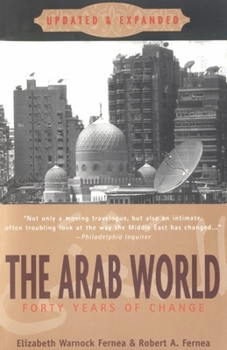The Arab World: Forty Years of Change, Updated and Expanded
Select Format
Select Condition 
Book Overview
In the ten years since Anchor first published Elizabeth and Robert Fernea's award-winning The Arab World: Personal Encounters , vast political and economic shifts have taken place: the end of the Iran/Iraq War and the Lebanese civil war; the outbreak of the Gulf War; the historic 1993 peace accords between Israel and the Palestinians, to name just a few. Which is why the Ferneas, leading scholars in Middle Eastern studies, felt a need to return to the same towns and cities they had written about previously-to see how these changes had affected the region and the people who live in it. The authors reveal the human face of the Arab World as they revisit and talk with newsmakers and colleagues, old friends and new. Their forty years of experience in the region help illuminate the human consequences of changes all too often discussed in abstractions and generalizations: the military conflicts, new urbanization, labor migration, religious revival, as well as radical changes in the roles of men, women, and the family. With new chapters on Baghdad, Beirut, Amman, Jerusalem, Marrakech, and Cairo, this new edition of The Arab World will strengthen its reputation as a book "which should be required reading for anyone with a serious interest in the Middle East" ( The Washington Report on Middle East Affairs ).
Format:Paperback
Language:English
ISBN:0385485204
ISBN13:9780385485203
Release Date:June 1997
Publisher:Anchor Books
Length:576 Pages
Weight:1.14 lbs.
Dimensions:1.3" x 5.3" x 8.4"
Customer Reviews
1 rating
Retrospective Collection
Published by Thriftbooks.com User , 19 years ago
This book is a collection of personal essays by Elizabeth and Robert Fernea concerning aspects of daily life in the several corners of the Arab world where they lived and conducted their anthropological research. The areas covered include Beirut (Lebanon), Amman (Jordan), Marrakech (Morocco), Cairo and Nubia (Egypt), Hail (Saudi Arabia), the West Bank, and Baghdad and Al-Nahra (Iraq). The Ferneas began their acquaintance with Arabia in 1956, when in their first year of marriage, Robert Fernea chose to do his doctoral research in Al-Nahra Iraq, and Elizabeth accompanied him there. After Robert was awarded his doctorate, the Ferneas went to Egypt, where Robert took a teaching post at the American University in Cairo. While in Egypt, Elizabeth wrote her now-classic description of women's life in Iraq, Guests of the Sheikh. Later research projects took the Ferneas, together with their three children, to Nubia and Marrakech. In each location, the Ferneas observed local cultures for their formal academic publications. But they also kept journals of their daily experiences in dealing with the culture and trying to learn the answers to anthropological questions as Westerners, and it is excerpts from these journals that appear here. Interspersed with these descriptions of their personal experiences are short background or follow-up essays that provide further information about some of the associated topics. For readers who are not familiar with the Ferneas' previous work, especially Elizabeth Fernea's, the title of the book, The Arab World, may be a bit misleading. It is not the goal of this book to provide a comprehensive historical or political analysis of the region. Instead, the book provides mainly a collection of personal experiences of a family who lived and conducted research in the region off and on for over 40 years. In each country covered in this book, the Ferneas have made multiple visits over time, allowing them to compare the changes brought about development. The book also provides an epilogue of sorts for readers of the Ferneas' other books, such as Guests of the Sheikh or A View of the Nile. As they return to their various "hometowns", the Ferneas look up old friends and bring us up to date on how life has treated them.





